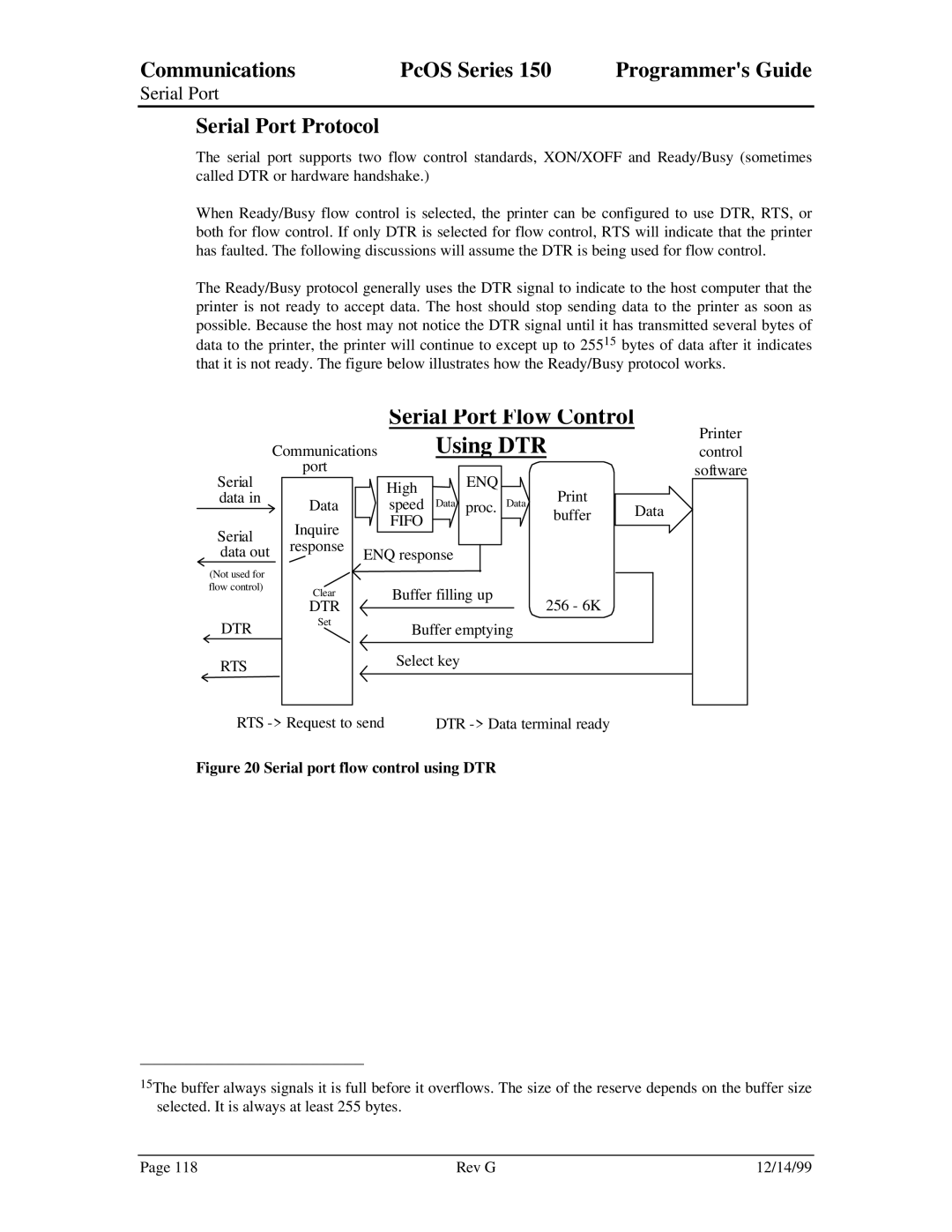
Communications | PcOS Series 150 | Programmer's Guide |
Serial Port
Serial Port Protocol
The serial port supports two flow control standards, XON/XOFF and Ready/Busy (sometimes called DTR or hardware handshake.)
When Ready/Busy flow control is selected, the printer can be configured to use DTR, RTS, or both for flow control. If only DTR is selected for flow control, RTS will indicate that the printer has faulted. The following discussions will assume the DTR is being used for flow control.
The Ready/Busy protocol generally uses the DTR signal to indicate to the host computer that the printer is not ready to accept data. The host should stop sending data to the printer as soon as possible. Because the host may not notice the DTR signal until it has transmitted several bytes of data to the printer, the printer will continue to except up to 25515 bytes of data after it indicates that it is not ready. The figure below illustrates how the Ready/Busy protocol works.
Serial Port Flow Control
|
|
|
|
|
|
|
|
|
| Using DTR |
|
|
| Printer | |||||||
|
| Communications |
|
|
|
| control | ||||||||||||||
|
|
|
| port |
|
|
|
|
|
|
|
|
|
|
|
|
|
|
|
| software |
| Serial |
|
|
|
|
|
|
|
|
|
| ENQ |
|
|
|
|
|
| |||
|
|
|
|
|
|
|
| High |
|
|
|
|
|
|
|
|
| ||||
| data in |
|
|
|
|
|
|
|
|
|
|
|
|
|
|
|
|
|
| ||
|
|
| Data |
|
|
|
| speed | Data |
| proc. | Data | Data |
| |||||||
|
|
|
|
|
|
|
|
|
|
|
|
| buffer |
| |||||||
|
|
|
|
|
|
|
|
| FIFO |
|
|
|
|
|
| ||||||
| Serial |
|
| Inquire |
|
|
|
|
|
|
|
|
|
|
|
|
|
|
|
|
|
|
|
|
|
|
|
|
|
|
|
|
|
|
|
|
|
|
|
|
| ||
|
|
| response |
|
|
|
|
|
|
|
|
|
|
|
|
|
|
|
|
| |
| data out |
|
|
| ENQ response |
|
|
|
|
|
|
|
|
| |||||||
|
|
|
|
|
|
|
|
|
|
|
|
|
| ||||||||
| (Not used for |
|
|
|
|
|
|
|
|
|
|
|
|
|
|
|
|
|
|
|
|
|
|
|
|
|
|
|
|
|
|
|
|
|
|
|
|
|
|
|
|
| |
| flow control) |
|
| Clear |
|
|
|
| Buffer filling up |
|
|
|
|
|
|
| |||||
|
|
|
|
|
|
|
|
|
| 256 - 6K |
|
|
|
| |||||||
|
|
|
| DTR |
|
|
|
|
|
|
|
|
|
|
|
|
|
|
|
| |
| DTR |
|
| Set |
|
|
|
| Buffer emptying |
|
|
|
|
| |||||||
|
|
|
|
|
|
|
|
|
|
|
|
| |||||||||
|
|
|
|
|
|
|
|
|
|
|
|
|
|
|
|
|
|
|
|
|
|
| RTS |
|
|
|
|
|
|
| Select key |
|
|
|
|
|
|
|
|
| |||
|
|
|
|
|
|
|
|
|
|
|
|
|
|
|
|
|
|
|
|
| |
|
|
|
|
|
|
|
|
|
|
|
|
|
|
|
|
|
|
|
|
|
|
| RTS |
| DTR |
|
|
|
| ||||||||||||||
Figure 20 Serial port flow control using DTR
15The buffer always signals it is full before it overflows. The size of the reserve depends on the buffer size selected. It is always at least 255 bytes.
Page 118 | Rev G | 12/14/99 |
